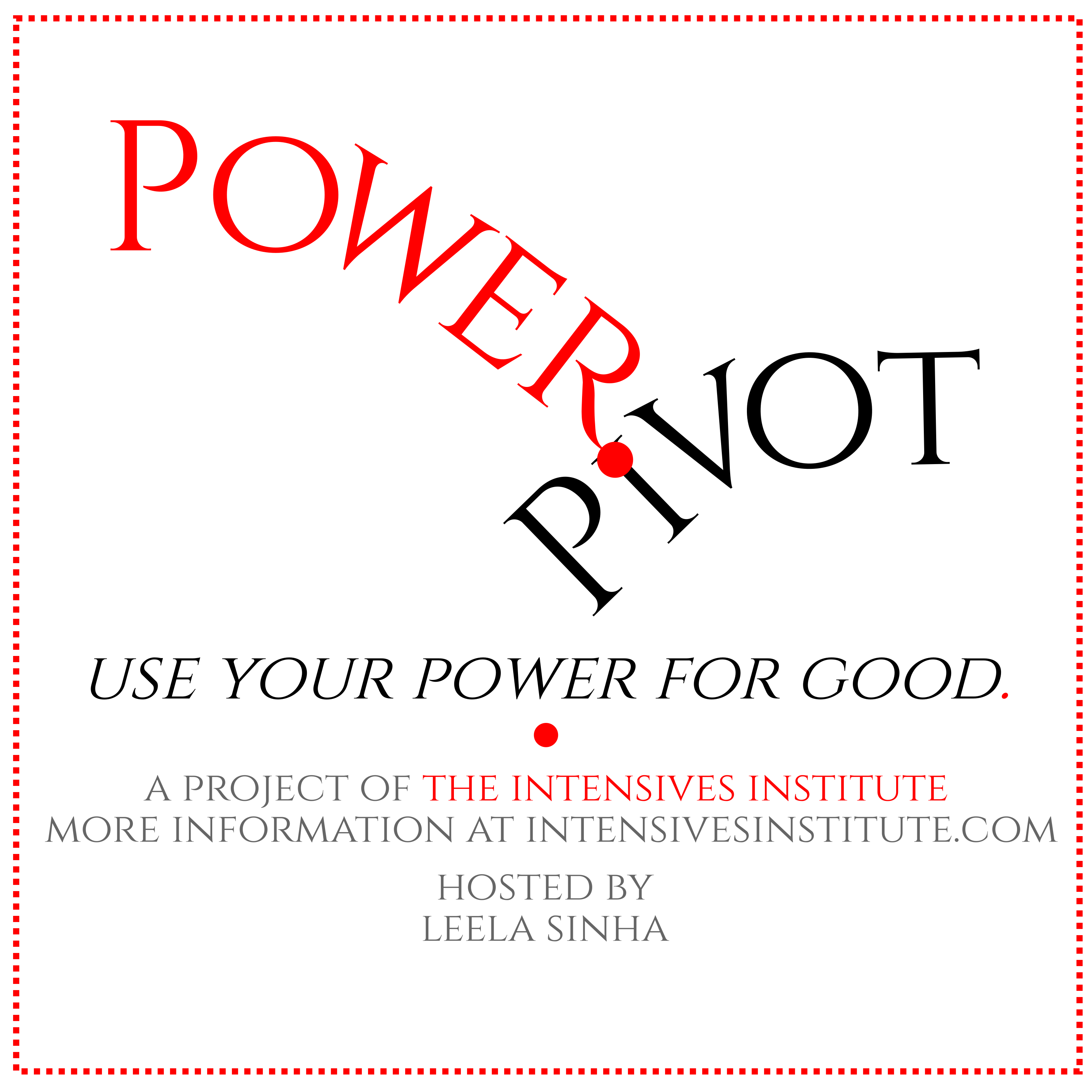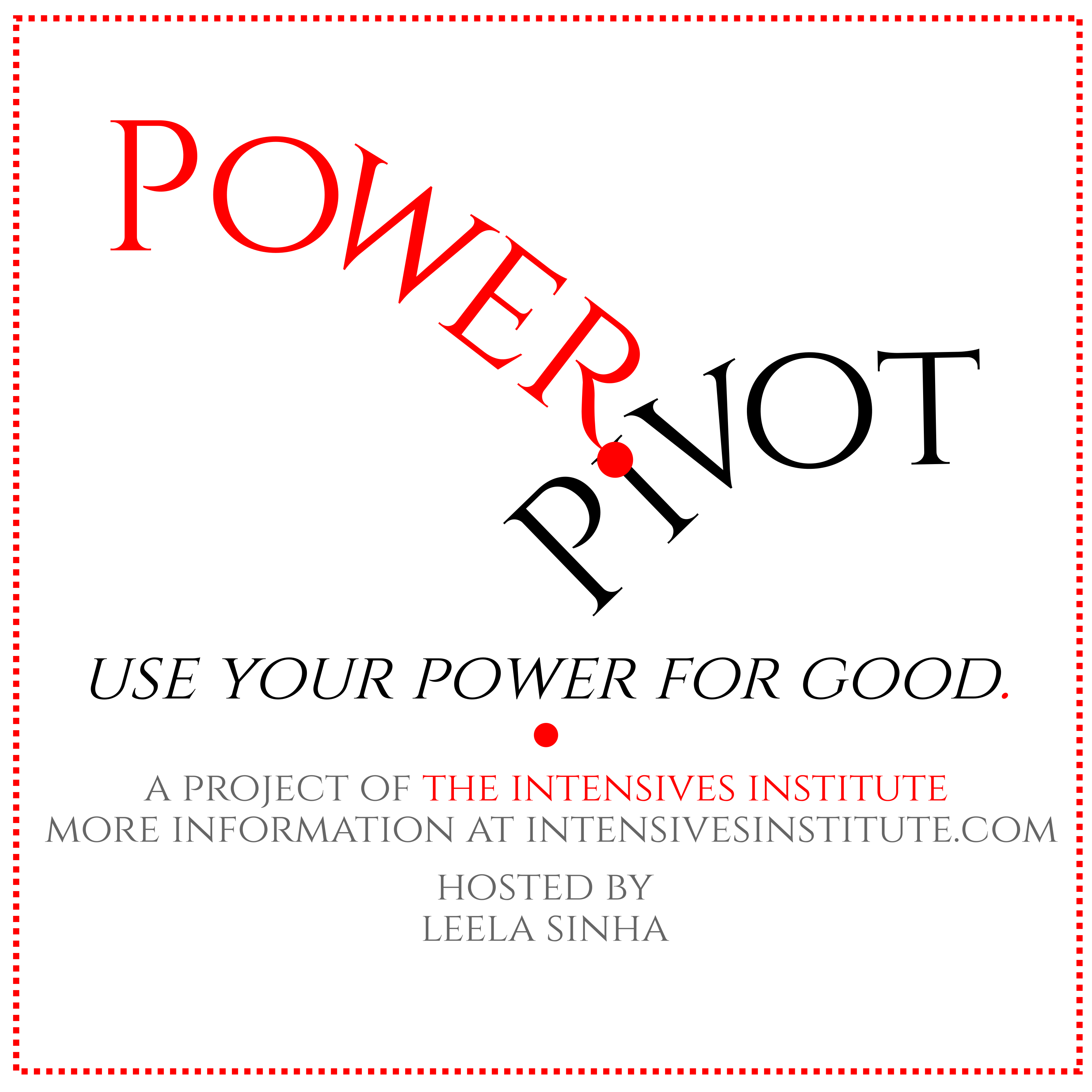Episode 94
judgment and grace
"Sometimes I'm right, and it doesn't matter. What matters is that they're having their life and they're experiencing their thing. And when you bring that to leadership, it completely changes how you function... Above all, I wish to put down disdain, because it carries with it disrespect."
Transcript and notes:
https://dev.intensivesinstitute.com/captivate-podcast/judgment-and-grace
Recorded 3 May 2023.
Transcript
Hi, everyone, thanks for tuning in.
You know, one thing about intensiveness- when I first wrote my book and was formulating the initial framework, I really thought that judgmentalism was built in, it was baked into being an intensive. That along with our frequency of being right, and our strong sense that we were right, we were doomed, compelled, fated to have this idea that everybody who was not thinking like us, was fundamentally flawed. Like that there was this thing, this overlay of judgment about it.
And that usually goes with an overlay of judgment about ourselves. And both the idea that we can maintain this excruciatingly high standard. And the constant disappointment that we are not maintaining the excruciatingly high standard. And I absolutely detest putting things on age. So I'm not going to. What I'm going to say is that there are certain kinds of life experience that have changed me about that. And I no longer think that we are doomed to feel constantly disappointed in everyone.
I do think we can. And I don't think the standards go away. Those standards remain. But What changes is our expectations. Expectation is such an interesting phenomenon, it creates so much pain, so much disappointment. Especially when we think something is so obvious that we shouldn't have to spell it out. That we couldn't possibly need to say it out loud, that it would be condescending to tell people.
Friends, it is basically never condescending to explain what you want. It is however, sometimes condescending when you put a judgement on it. When you put an expectation on it, when you think that because you think you have explained it, it is a) now done and b) now default. That it's definitely going to happen. That's not how it works, especially with other intensives.
But for years, I thought that if I explained myself well enough, and somebody understood where it was going, then the odds were- very, very high, the odds were- that they would agree with me, and that it would be obvious to both of us that we should do what I thought we should do. This leads us to that overexplaining thing where we layer in the explanation over and over again, we say what we think and the other person might disagree or not get it.
And so we say what we think with more detail, and at longer length. And they still don't agree. And so we explain more and more getting increasingly frustrated that clearly we're not getting our point across when, in fact, often we are getting our point across and they just aren't, aren't in agreement. Especially if they're not trying to press us toward agreeing with them. It may be a long time before we realize that thing that we've been explaining isn't going to happen.
And sometimes, I have discovered, that I am not in fact explaining it as well as I thought I was. That the things the leaps of imagination that I'm making are in my imagination alone. Now that can feel very isolating. And sometimes crushingly disappointing if I think the other person is close enough to me, or has worked with me long enough, that they should, they should know, right?
There's the should, there's the expectation right there.
But the older I get in my case, but I don't think it's necessarily age, I think it really is accrued particular kinds of life experience, not just life experience in general. The older I get, the more I have withdrawn my expectation from other people. Sometimes it's lonely, because I like expecting to be met, to be understood. And sometimes I'm very pleasantly surprised.
I recently had the occasion to have a long conversation with someone I didn't know very well and at least from my perspective, we were in sync on a lot of things and that was a delightful experience. But I just don't expect- I don't expect it anymore. And and some of that is kind of meta disappointing, right just not to be able to expect people to get it. But it also, it means that I'm less judgmental.
Most of the time. I have to admit, there are some things that I think should be obvious, especially in this current world. I think that trans people having rights should be obvious. I think that addressing climate change should be an obvious priority. I think that acting like we're in the middle of a pandemic, when we're in the middle of a pandemic should be a priority.
But in general, when I am not in a place of fear- all of those things generate a sense of fear. Almost a sense of desperation for me. Partially because they're personal. And partially because they affect our world, in a kind of immediate snowball-y kind of way. Like, there's a sense that we can't afford to get this decision wrong.
But in general, I have finally learned that thing that Oprah says about when people tell you who they are, believe them. And What that means is that I moved through the world, as though I'm surrounded by, I don't know- As I am surrounded by- all of these natural things, some of whom are human. But I don't have a lot of expectations for the squirrels who eat the peanuts on the table in my backyard. And I try to have equally low, not low in the sense of high expectations or low expectations in the sense of rightness, and wrongness. But in the sense of volume.
Do you have a lot of expectations or no expectations? I'm with Alice Walker on this "expect nothing, live frugally on surprise." And what that means is, I'm a lot less judgmental than I was. And part of that is because I have learned all the ways in which I personally can fail. I'm sure there are more.
But even all the ways that I have learned to this point, have left me a lot less likely to expect that my rightness will be better than somebody else's way of doing things. I may be right. But that doesn't necessarily mean that I am better. I'm just right. I'm right about myself. Right about whatever happened last Tuesday. But even if my facts are correct, like somebody else is going through something else and having a different experience and a different perspective and a different worldview and bringing different trauma.
It's not like I don't have trauma that's affecting my thinking and my behavior. I do. And so I let go of things more easily. I turn away from things more easily. I'm more willing to believe that I am not the perfect savior that will make everything better for everyone. I'm not.
But I do still believe in intensiveness. It's not perfect. It's not a perfect model. It hasn't been perfectly scientifically tested, although honestly, I could go on an entire rant and maybe I will about ways of knowing.
Because I am increasingly suspicious of what we call science. Not- not because science isn't useful. It has its place. But I think we have injected it into many places where it doesn't serve and doesn't belong. So science about pandemics? Yes, absolutely. We should be doing studies. We should be using what we know about scientific development, to create remedies, to create prevention, to create safety protocols. Those are things where sciences are useful.
But we also have to recognize that not everything works for everyone. That people vary. And so when it comes to things like psychology and brains, when it comes to things like learning styles. When it comes to things like housing needs- people vary wildly. There is no one size fits all. We are not pieces on an assembly line. And sometimes the most effective learning is in a story where five people hear five different things.
The idea that your English teacher can ask for a single answer about what the author meant by this. Not only does it imply that you can mind read, which is ridiculous, but also: what it meant to you, and what it meant to someone else could be totally different. The thing that we need to learn in this moment from that story could be directly opposite. And we might be able to find both meanings in that story. That's why proof texting out of the Bible makes no sense.
And if that's the case, then if somebody is doing something, making a choice, going a direction that I don't understand... as long as it's not harming other people, I try really hard to keep my heart out of their business. Sometimes people just need things that we don't understand. And as an intensive, I'm used to understanding people's motivations, I'm used to being able to predict people's thinking, I'm used to being able to get out ahead of other people's brains about themselves. And sometimes I'm right.
Sometimes I'm right, and it doesn't matter. What matters is that they're having their life and they're experiencing their thing. And when you bring that to leadership, it completely changes how you function. I think as I have grown into leadership, I have gone almost to the other end of the field. I'm almost playing for a completely different team than I was, when I started in leadership when I was 14, or 15. Which is right and appropriate.
I'm almost 48; I should be somewhere different from where I was at 14 or 15. And I don't think necessarily, that 14 or 15 year old me would be disappointed to hear that I am more embracing; that I am more flexible. I think 14 year old me might be a little distressed that I press with less urgency. But that's merely a concession to the reality of human behavior.
All of this stuff feels urgent to me right now. But the reality is that I have this thing that I am trying to teach as many people as possible about, and people are so overwhelmed that mostly they can't listen. And if people can't hear you, there's no sense shouting at them about it. They're busy, they're preoccupied. We're all tired. We all have eleventy million things to think about.
And so my question is, how can I bring compassion and grace and love into spaces in a way that makes action feel more spacious. That if people do want to listen, if people do want something of what I've got, people are interested. How can they? How can you? How can we take up little pieces, even though that's not the intensive way, right, the intensive way is to dive in to do an immersive whatever, a five day retreat weekend thing where we think and talk and analyze our way all the way through it from one side to the other. And we emerge with this bone deep understanding. And that is also possible.
I would love to find a way that is COVID safer to do a weekend long intensives retreat. That would be fantastic. But who's got the time? Who's got the energy? Right now, not a lot of people. So sometimes we have to use expansive tactics and sometimes knowing that and embodying that- those expansive tactics that we use to meet our intensive ends. Sometimes embodying that gives us space to be less judgmental. Less you should do this you should understand this. I don't know why you're not doing this yet. Less you didn't meet my expectations and so I now carry disdain for you.
Disdain is toxic. It's embedded in the Four Horsemen of Gottman's Apocalypse. Above all, I wish to put down disdain because it carries with it disrespect. And so instead, I find myself in this- deep in middle age- I find myself trying harder and harder- and succeeding- in letting go. And just allowing people to be where they are, and not trying to move them from that place unless it is harming other people. Which is why the things that matter to me are things like racism, climate change, public health.
Which is why the things that matter to me are about decreasing the amount of suffering in the world, which is why I think I sound probably a lot more like a Buddhist than I used to.
I don't claim Buddhism, and it doesn't claim me. But I'm more and more aware of the origin story of the prince who encountered suffering for the first time as a young adult, and felt that reducing suffering in the world was the most important thing.
Now I don't believe in being in resistance to something that we want to remove. Because if we build our identities around that resistance, then there's nothing left of us if it does go away, so we are compelling its continued existence. Instead, I believe in dreaming past it. And what a glorious world would we have if we continued to move toward right being. But we did so without judgment of other people.
I need to add a PS which is I do believe it is okay to judge actions right and wrong. I think we have gravely harmed our society by going so far in the direction of "I can't possibly know" that we landed ourselves with both feet in both-sides-ism. This is not about the great moral questions.
This is not about movements that cause harm. This is about judging other people for their struggles that we know nothing about.
Thanks for being with me. Talk to you soon.


